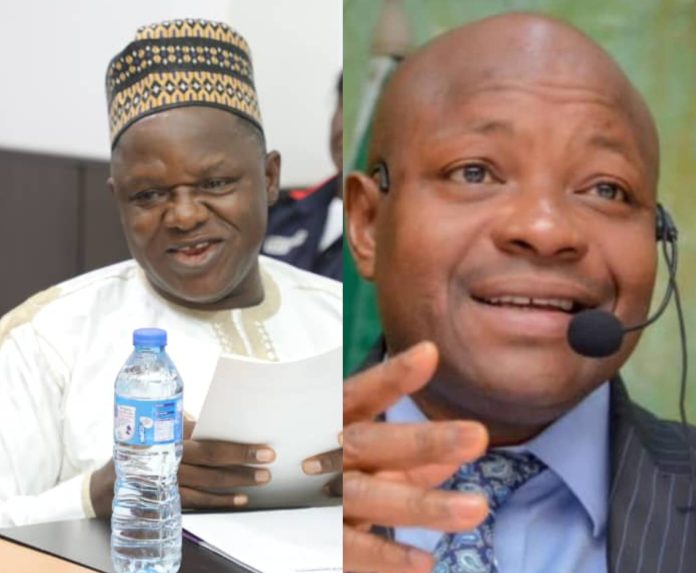The National Commission for Persons with Disabilities (NCPWD) has initiated a critical move toward bolstering the security of Persons with Disabilities (PWDs) across Nigeria by engaging the Department of State Services (DSS) in a strategic partnership. The Executive Secretary of NCPWD, Chief Ayuba Gufwan, led a delegation to the DSS Headquarters in Abuja on October 24, 2024, for a high-level meeting focused on addressing the growing insecurity faced by the disability community.
The meeting was hosted by Mr. Jonathan Kure, representing the DSS Director-General, Mr. Adeola Oluwatosin Ajayi MON. The discussions aimed to foster collaboration between the NCPWD and the DSS to ensure better security and protection for PWDs in light of recent alarming incidents.
Growing Threats to Persons with Disabilities
During the meeting, Chief Gufwan expressed deep concern over rising cases of violence and insecurity targeting persons with disabilities. He highlighted two recent tragic incidents that have shaken the disability community:
- The murder of Jonathan Udochukwu, a staff member of the Central Bank of Nigeria (CBN), who was known for his advocacy for disability rights.
- The brutal killing of Bala Tsoho, MFR, a respected figure and owner of a rehabilitation center in Buhari, Federal Capital Territory (FCT).
“These tragic losses are a stark reminder of the vulnerability of persons with disabilities in our society,” Gufwan lamented. “The recent cases underscore the urgent need for heightened security measures to protect the lives of PWDs and ensure that their fundamental rights are safeguarded.”
Gufwan stressed that the insecurity faced by PWDs goes beyond isolated incidents, reflecting systemic challenges that require immediate attention. “We must not allow PWDs to continue living in fear—everyone deserves to feel safe in their community, regardless of ability or disability,” he added.
Call for Compliance with Accessibility Laws
In addition to security concerns, Chief Gufwan emphasized the importance of full compliance with accessibility laws across government institutions and public facilities. He reminded the DSS of the existing legal frameworks mandating inclusivity, which include provisions to make public spaces accessible to persons with disabilities. “Accessibility is not just about ease of movement,” Gufwan explained. “It’s about ensuring dignity and inclusion, while also promoting safety for everyone.”
The NCPWD has long advocated for the implementation of the Disability Act, which requires public institutions to provide access ramps, braille materials, sign language interpreters, and other essential accessibility measures. Gufwan noted that security risks can be mitigated if public facilities are designed to be inclusive and accessible. “When spaces are accessible, PWDs are empowered to engage fully in society, which can deter crime and isolation,” he said.
DSS Pledges Support for Long-term Collaboration
In his response, Mr. Kure, representing the DSS Director-General, assured the NCPWD of the agency’s commitment to improving security for persons with disabilities. “The DSS stands ready to partner with the NCPWD in addressing the security challenges faced by PWDs,” Kure affirmed. “We are dedicated to protecting the lives of all Nigerians, particularly vulnerable groups like persons with disabilities.”
Kure also expressed optimism about the long-term collaboration between the DSS and the NCPWD, highlighting the need for proactive measures to prevent future incidents. “This is not just a one-time engagement,” he said. “We are committed to working with the NCPWD to develop security strategies that will provide lasting solutions to the challenges faced by PWDs.”
A Crucial Step Toward Inclusive Security
This meeting represents a milestone in the efforts to ensure the safety and security of the growing population of PWDs in Nigeria. With an estimated 27 million persons living with disabilities in the country, ensuring their protection is becoming increasingly critical. Chief Gufwan expressed hope that the partnership with the DSS will yield tangible results, helping to create an environment where PWDs feel safe, valued, and respected.
“We cannot underestimate the importance of security in promoting inclusion,” Gufwan said. “When persons with disabilities feel secure, they can participate more actively in society, contributing their skills and talents to national development.”
The NCPWD’s move to seek a partnership with the DSS underscores the commission’s commitment to tackling issues head-on and advocating for the rights and safety of persons with disabilities. The commission also called on other security agencies, civil society organizations, and stakeholders to join hands in building a safe and inclusive society for all Nigerians.
A Call to Action
Chief Gufwan concluded the meeting by calling for swift and collective action to address the rising security challenges faced by PWDs. “Security is a shared responsibility,” he said. “We urge the government, private institutions, and individuals to work together to protect the lives and dignity of PWDs. Everyone has a role to play in ensuring that persons with disabilities can live without fear.”
The meeting at the DSS Headquarters signals a positive step toward building trust between security agencies and the disability community. With the DSS’s assurance of support and the NCPWD’s unwavering advocacy, there is hope for a safer and more inclusive future for persons with disabilities in Nigeria.


